Spot On: PAX 2007
Penny Arcade Expo brings entertainment in spades as average-Joe attendees dig into playable previews, Q&A-style developer panels, and nerdcore musicfest.
PAX isn't a word that most people typically associate with games. More often than not, the word inspires thoughts of the Pax Romana or Pax Britannica--a time of peace, not the violence-ridden, pornographic games industry, right? So what is PAX? Strictly speaking, PAX, or the Penny Arcade Expo, is an annual, open-to-the-public event dedicated to geek culture that emerged from Jerry Holkins and Mike Krahulik's popular, and notoriously deranged, webcomic Penny Arcade.
In 2004, the first PAX was held in Bellevue, Washington, and attracted some 3,000 attendees. A modest number of exhibitors including Microsoft and Ubisoft gave the crowd a sneak peek and playable demos at their upcoming lineup of games. Other festivities included gaming tournaments, tabletop games, industry-insider Q&As, geek-culture-influenced concerts, and the Omegathon. A gaming tournament of sorts, the Omegathon dropped 20 contestants into a crucible heated by intense retro gaming, with the ultimate prize being a massive collection of games.
Every subsequent year since 2004 has seen an exponential increase in crowd turnout, with approximately 9,000 people showing up in 2005 and 19,000 making the trek to Washington in 2006. With a projected 30,000 attendees at this year's show, PAX took over its new digs at the Washington State Convention Center, a sprawling 200,000 square-foot complex in the heart of Seattle. One factor spurring this exponential growth is the open-to-the-public nature of the event, where admission is $50 for a three-day, all-access pass, or $30 for a single day.
Those massive numbers, combined with the Penny Arcade comic's sheer zaniness, have led many to proclaim that PAX has become the spiritual successor to the old Electronic Entertainment Expo. But Krahulik thinks that simply is not the case.
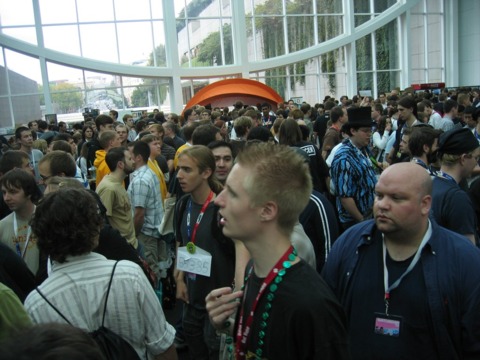
"PAX is not the new E3," he said last year leading up to PAX 2006. "E3 failed. If someone else wants to be the new E3 they are welcome to it. They can even set up shop in the carcass of the giant and claim his power, but E3 is dead and it died for a reason. If I were them I wouldn't be in such a hurry to stuff myself in that coffin, and I certainly wouldn't boast about it."
Echoing Krahulik's words at this year's show, Holkins differentiated PAX from the E3 of old, saying that the LA-based convention was an industry event, and it had an industry agenda. PAX, on the other hand, is for the fans, and therefore exists wholly outside the extreme spin and hype surrounding that other event.
That mentality was echoed by PAX keynote speaker Wil Wheaton, who took the stage not long after the ridiculous queue of eager gamers flooded into the convention center at 2 p.m. Best known for his role as Wesley Crusher in the sci-fi television series Star Trek: The Next Generation, Wheaton extolled the social aspects of gaming while ridiculing those who wished to demonize the medium. Concluding his speech on a high note, Wheaton noted that games are about experiencing joy, and everyone in attendance should go forth with that in mind. And, of course, everyone did.
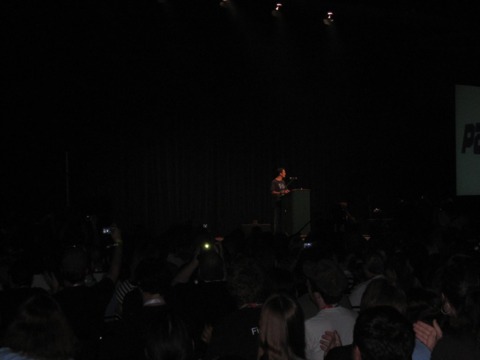
While PAX has a widespread appeal, its central component is the games. Playable games. Games that nearly all in attendance would have had to wait several long months to get even a whiff of. The exhibition hall where these games were housed was a spectacle unto itself. Packed to the brim with game kiosks sporting high-quality HDTVs, the PAX show floor was occupied by more than 65 different exhibitors plying their latest wares to the eager masses. Aside from the games, several merchants set up shop in the prime real estate where tens of thousands of gamers would be flooding through. One such retailer was Japanese-import superstore Pink Godzilla, who had on hand rare retro games running in excess of $300 apiece.
By far drawing the largest crowd was Harmonix's rhythm game Rock Band, which could be found in two separate locations. However, despite event organizers' efforts to spread out the crowd, both spaces attracted attendees in droves, clogging vital areas of movement like fatty deposits of plaque on artery walls.
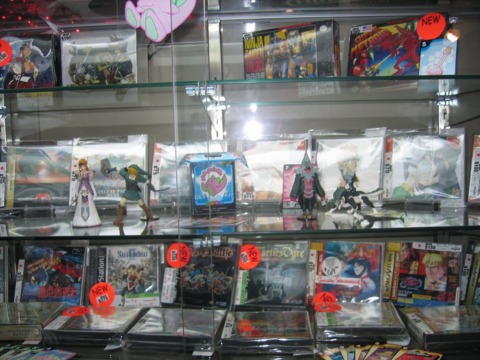
And that's not to mention the many other games playable for the first time by the public. Two other favorites for the show were Nintendo's Metroid Prime 3: Corruption and Eidos' hyperviolent shooter Kane & Lynch: Dead Men. The show floor contained many other upcoming gems as well, including Ubisoft's Haze, Naughty Dog's Uncharted: Drake's Fortune, and Ninja Theory's Heavenly Sword, among others. The massively multiplayer online gaming circuit was also well represented, with NCsoft offering up Richard Garriott's Tabula Rasa, EA Mythic giving eventgoers a chance to jump into Warhammer Online, and Flying Lab Software proudly proclaiming support for piracy with Pirates of the Burning Sea.
Unsurprisingly, the early access to such a wide array of hotly anticipated titles stunned many eventgoers. Enthusiasm was palpable in the exhibition hall, and when questioned, not a single soul had anything other than gushingly positive comments about the setup for the event.
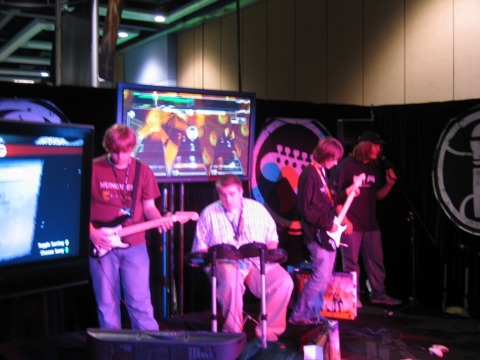
PAX also featured its fair share of panels from industry insiders. A wide array of topics was covered at the event, ranging from storytelling in games to online communities to the culture of Japanese gaming. However, as it was an event for the people, PAX also featured many panels aimed at those looking to break into the industry. Even at those sessions with a clear industry-perspective focus, the majority of sessions at PAX allotted a significant amount of time to audience-led Q&As. And while more than a few knowledge-seekers were struck with a case of the maladjusted jitters, attendees were eager to line up and oftentimes stammer out their questions at the resident experts.
The most popular of these sessions was, naturally, the ones hosted by the men of the hour, Krahulik and Holkins. More than gracious hosts, the two were quick to grant requests from the crowd, share insights into their creative process, and respond to a melange of offbeat, eyebrow-raising non sequiturs, all the while being thoroughly entertaining. Likewise, one of the least popular sessions was helmed by surprise guest Uwe Boll, who endured withering criticism while answering questions posed by a moblike crowd.
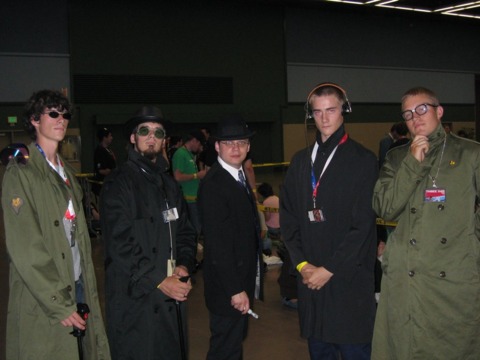
As PAX is more about celebrating the professed "nerd culture" than it its showing of the latest from the gaming industry, other forms of gaming were also well represented at the show. For as many groups huddled together over their glowing Nintendo DS screens, there were an equal amount squaring off in epic collectible card game feuds or playing out grandiose adventures through their mind's eye in tabletop RPGs. More than a few eventgoers took the opportunity to don their cosplay garb for these sessions, with questionably clad women dressed in wholly inappropriate fantasy attire appearing frequently. Other PAX attendees stood out in equally fanciful wardrobes that, to the untrained eye, appeared to be costumes. When questioned, however, these individuals freely admitted their outfits were standard, everyday attire.
Music was also a prominent aspect of this year's show. Dubbed the PAX Nerdcore Concert Series, Friday night saw indie outfits Freezepop and the OneUps join Optimus Rhyme and the NESkimos. Saturday night continued the eclectic mix of offerings, with sci-fi folk rocker Jonathan Coulton kicking the evening off, nerdcore hip-hop superstar MC Frontalot following, and heavy metal NES tribute band the Minibosses closing the night out. Needless to say, all the performances were epic.
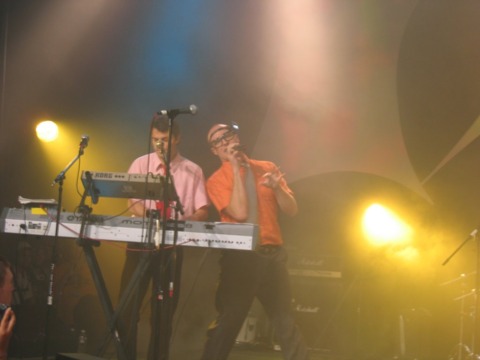
As in year's past, the Omegathon competition capped off this year's event. Playing out over six rounds, participants competed in games of Jenga, Calling All Cars!, Quake III, Rock Band, and Puzzle Quest. In the secretive final round, Bungie offered up two never-before-seen maps for the two remaining Omeganauts to battle it out on. This year's Omegathon winner, Ryan Zack of Bend, Oregon, walked away with an all-expenses-paid round trip for two to this year's Tokyo Game Show, as well as $5,000 in cash.
As a geyser of geek culture gone wild, PAX 2007 was unquestionably a success. As a business venture, it also generated sizable revenue: Although organizers had not supplied final attendance figures as of press time, by their 30,000-attendee estimate, the expo generated several million dollars from entry fees alone. But despite financial success and widespread publisher support, it's less clear what the future will hold for PAX. Will it continue to grow, or has it already overextended itself? Will it transform from a popular nerdcore event to a more mainstream gaming expo? Those are questions only PAX 2008 can answer.
For a virtual tour of the show floor, check out GameSpot's footage from the event.Got a news tip or want to contact us directly? Email news@gamespot.com
Join the conversation